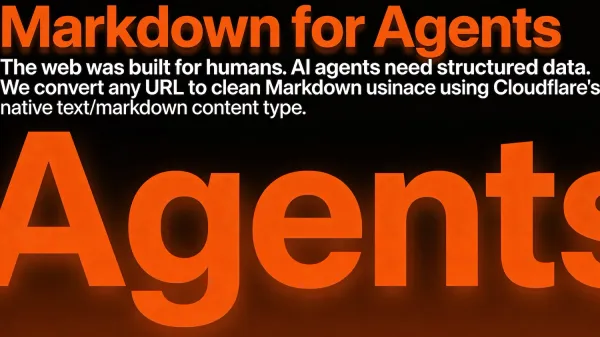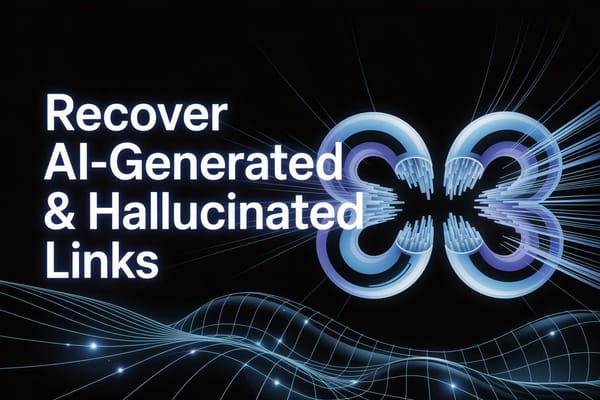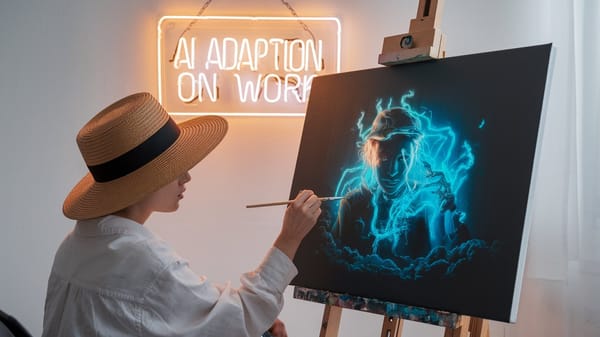After building multiple AI and lead generation companies since 2012, including LiveChatAI (2023), Popupsmart (2018), and FlatArt Agency (2012), I've never been more excited about a technological shift than the emergence of vertical AI agents. This isn't just another AI trend – it's a fundamental transformation.

The Historical Context: Learning from the SaaS Revolution

To understand the magnitude of this opportunity, let's look at a parallel from recent history: the SaaS revolution. Just as XML HTTP Request (Ajax) in 2004 catalyzed the SaaS boom by enabling rich web applications, today's advanced LLMs are enabling AI agents to perform like entire human teams.
The SaaS revolution played out in three waves:
- Mass consumer obvious ideas (email, docs, photos) - won by incumbents
- Non-obvious mass consumer ideas (Uber, Airbnb) - won by startups
- B2B vertical solutions - created 500+ unicorns
Why Vertical AI Agents Are Different
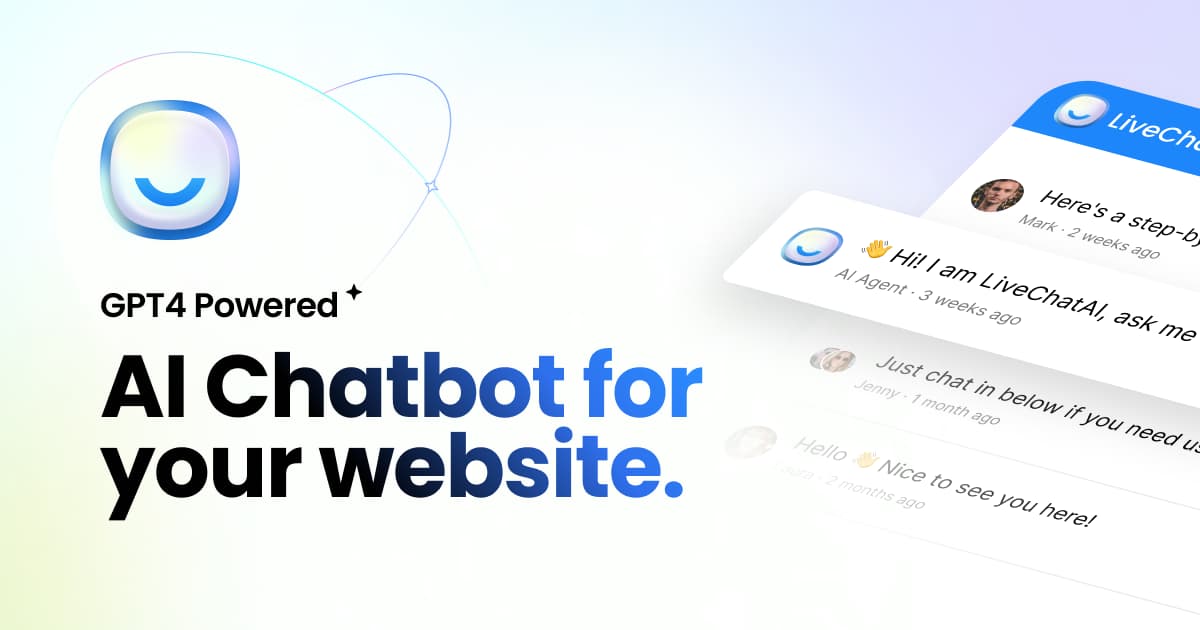
At LiveChatAI, we're learning a difficult but valuable lesson. Our initial strategy of building a general-purpose AI chatbot without focusing on any specific vertical has led to significant challenges:
- Our teams are stretched thin trying to understand and serve vastly different customer needs across politics, education, ecommerce, and other sectors
- Each industry requires unique knowledge bases, workflows, and compliance considerations, making our generic solution less effective
- We're finding ourselves competing with both general AI solutions and industry-specific tools, without having a clear competitive advantage in any space
Through market research and customer feedback, we've realized that successful AI implementations often thrive when they deeply understand and serve specific industry needs. That's why we're currently researching potential vertical focuses to specialize in. This strategic pivot isn't just about narrowing our scope – it's about delivering more value by becoming true experts in a chosen field.
The Transformation of Domain Expertise
Having worked with both generic and specialized AI solutions, I've identified three critical components for success:
- Deep Domain Understanding
- Industry-specific language and terminology
- Regulatory compliance requirements
- Workflow optimization patterns
- Expert Knowledge Capture
- Systematic documentation of tribal knowledge
- Real-world experience integration
- Continuous learning mechanisms
- Vertical Integration
- Industry-specific data sources
- Specialized tool integrations
- Custom workflow automation
The Rise of Vertical AI Agents: Market Set to Surge 9X to $47.1B by 2030 🚀
Market projections predict an explosive transformation in the vertical AI agents industry, with the market value soaring from $5.1B (2024) to $47.1B by 2030. This comprehensive analysis reveals how specialized AI solutions are reshaping enterprise automation with an unprecedented 400% year-over-year growth while maintaining robust 65% gross margins.
Key Growth Indicators:

- Market Expansion: A remarkable 44.8% CAGR through 2030, driven by increasing enterprise adoption
- Revenue Potential: Vertical AI applications are reaching 80% of traditional vertical SaaS system's average contract value
- Market Leaders: Industry experts anticipate at least five vertical AI companies achieving $100M+ in annual recurring revenue within 2-3 years
- Unicorn Potential: Analysts project the emergence of 300 vertical AI unicorns, mirroring the SaaS sector's success
Industry Impact:
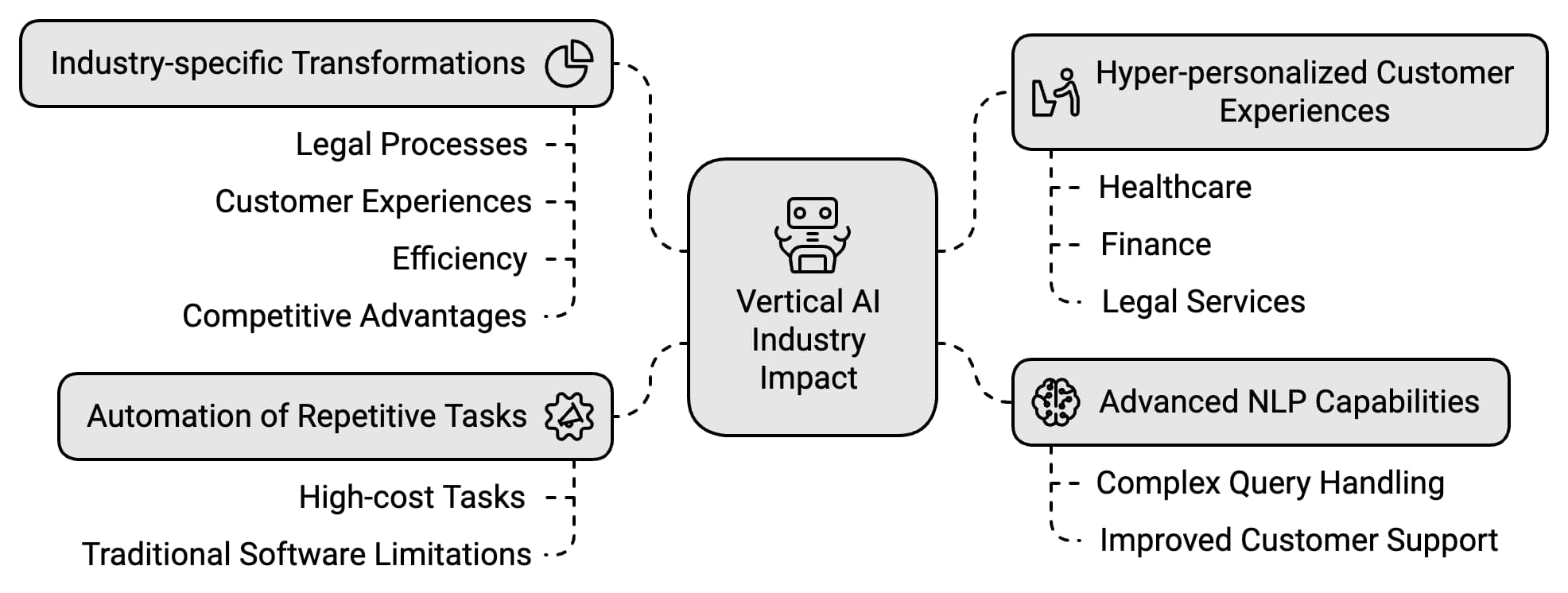
These specialized AI agents are revolutionizing various sectors through:
- Hyper-personalized customer experiences in healthcare, finance, and legal services
- Advanced Natural Language Processing capabilities for complex query handling
- Automation of high-cost repetitive tasks previously resistant to traditional software solutions
- Industry-specific transformations across multiple vertical markets
From automating legal processes to enhancing customer experiences, vertical AI represents the next frontier in industry-specific digital transformation. Forbes experts predict this technology will fundamentally reshape how businesses approach sector-specific challenges, promising unprecedented efficiency and competitive advantages for early adopters.
Building for Scale: Lessons from Real Implementations
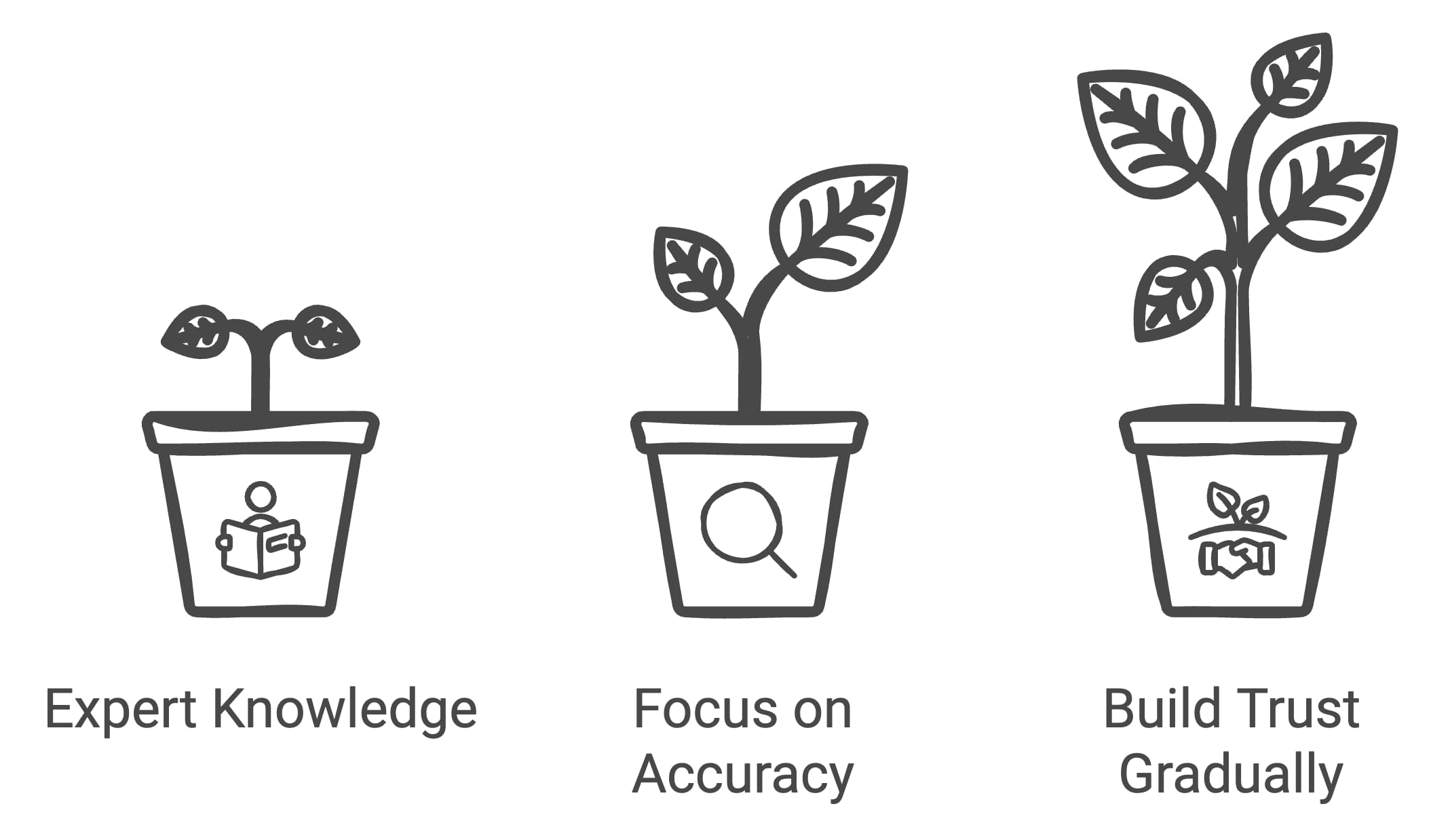
From scaling multiple SaaS companies, I've learned that vertical AI requires a different approach:
Start with Expert Knowledge
- Document expert workflows
- Create comprehensive test cases
- Build evaluation frameworks
Focus on Accuracy
Build Trust Gradually
- Begin with advisory roles
- Demonstrate consistent results
- Expand scope methodically
The Next Wave: Agentic AI
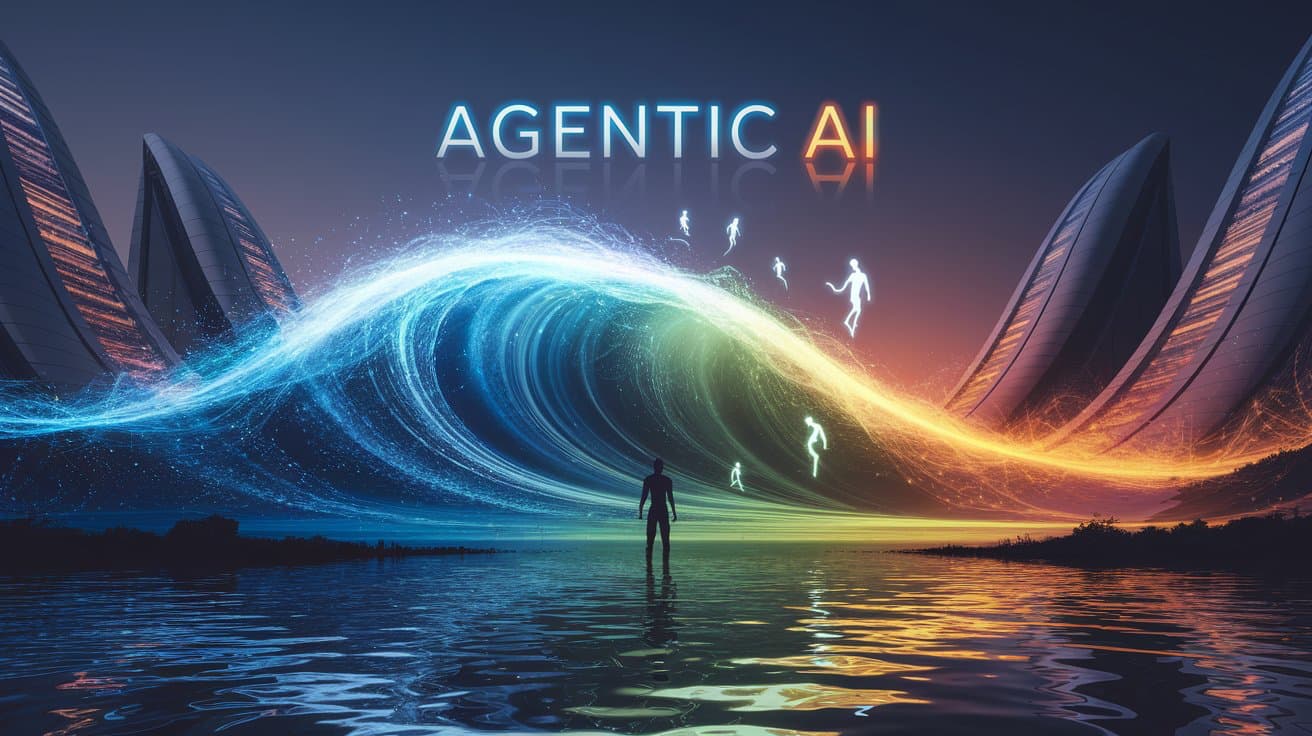
The latest development in vertical AI is the emergence of agentic AI - systems that can plan, reason, and execute complex tasks. At LiveChatAI, we're seeing this transform how AI agents operate:
- Planning Capabilities
- Task breakdown and prioritization
- Resource allocation
- Timeline management
- Reasoning Systems
- Context maintenance
- Decision logic
- Error handling
- Execution Framework
- Step-by-step implementation
- Progress monitoring
- Outcome optimization
Building Successful Vertical AI Companies
Drawing from my experience founding multiple companies, here's what matters most:
- Focus on Expertise Capture
- Start with industry experts
- Document tribal knowledge
- Build systematic training processes
- Scale Through Specialization
- Begin with narrow use cases
- Perfect the core workflow
- Expand within the vertical
The Future Landscape
Looking ahead, several exciting developments are emerging:
- Market Evolution
According to recent projections, we're looking at a $47.1 billion market by 2030, driven by:
- Increased AI model sophistication
- Better vertical-specific training data
- Growing enterprise acceptance
- Emerging Opportunities
Based on current trends and my market analysis, these verticals show particular promise:
- Healthcare documentation and analysis
- Legal contract automation
- Financial compliance and reporting
- Manufacturing optimization
As we look to the future, the opportunity in vertical AI agents is unprecedented. The combination of:
- Rapidly advancing technology
- Growing market acceptance
- Clear ROI potential
- Scalable implementation patterns
Creates perfect conditions for the next wave of billion-dollar companies.
Having witnessed both the SaaS revolution and now the AI transformation, I can say with confidence that we're just scratching the surface. The companies that will win in this space will be those that deeply understand their vertical and can execute with precision.
Implementation and Market Opportunities
Having built AI systems since 2012, I’ve observed a fundamental shift in how we capture and utilize expertise. Let me share a revealing story from LiveChatAI’s early days: In early 2023, we took on even more ambitious projects, such as supporting Kennedy Jr.’s campaign for the American election. Their team relied on our chatbot to engage with voters directly through their website. Over the course of the campaign, our chatbot handled over 200,000 messages—none of which were impolite, divisive, or inappropriate. Even Wired reported on the high standards we achieved. This milestone exemplifies the power of combining cutting-edge AI with human expertise to ensure not only accuracy but also alignment with our shared values of respect and inclusion.
The Three Pillars of Vertical AI Success
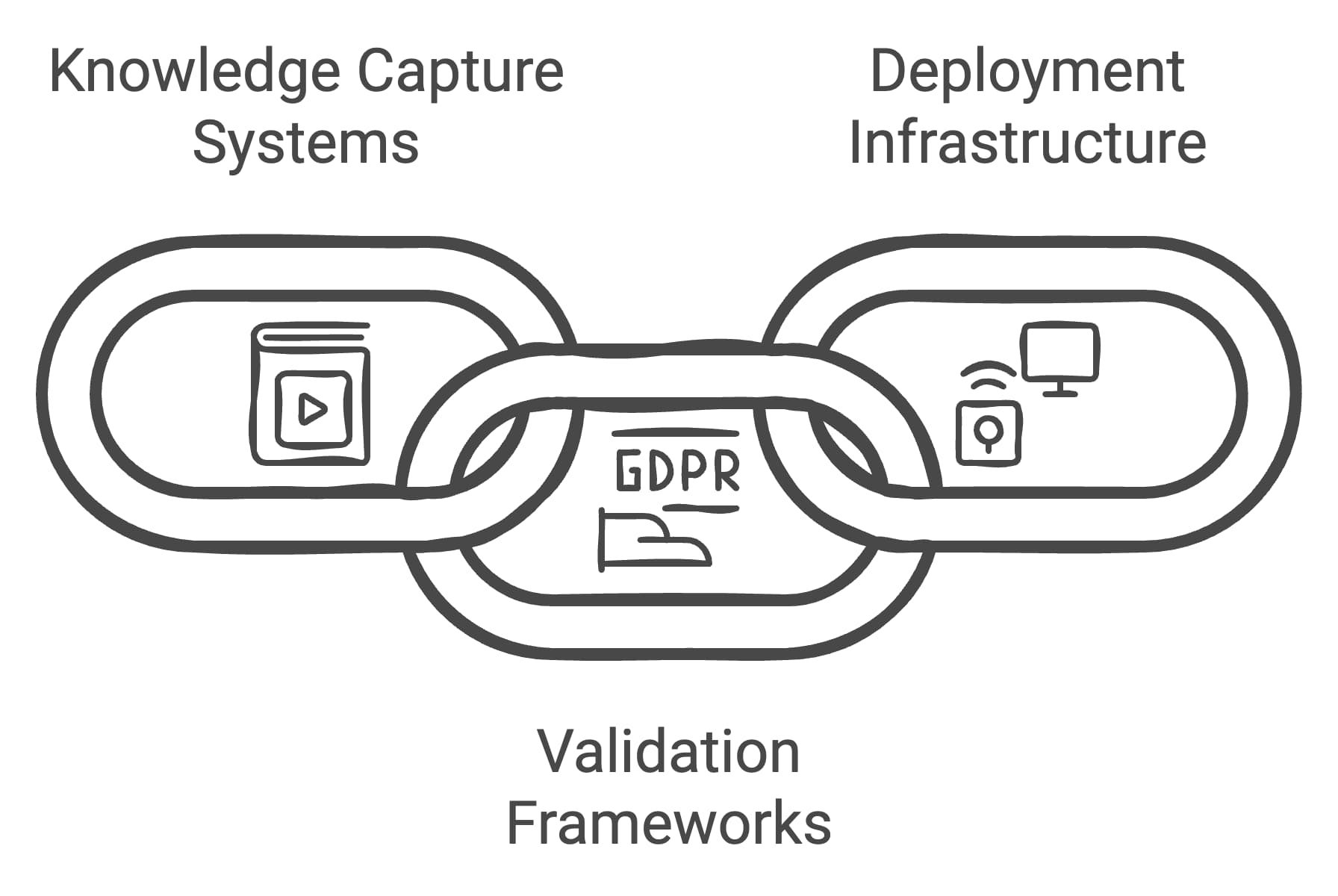
From my experience building LiveChatAI, successful vertical AI implementations rest on three core pillars:
- Knowledge Capture Systems
- Expert interview frameworks
- Structured documentation processes
- Continuous learning loops
- Validation Frameworks
- Domain-specific test suites
- Real-world scenario validation
- Expert review processes
- Deployment Infrastructure
- Integration capabilities
- Monitoring systems
- Feedback loops
Having built multiple AI product, I can confidently say that the opportunities in vertical AI agents are unprecedented. The key is to focus on solving real problems with deep domain expertise while maintaining the agility to adapt to rapid technological changes.
Frequently Asked Questions About Vertical AI Agents
General Questions
What exactly is a vertical AI agent?
A vertical AI agent is a specialized AI system designed for a specific industry or use case. Unlike general-purpose AI (like ChatGPT), vertical AI agents have deep domain expertise and can handle complex, industry-specific tasks. At LivechatAI, we've seen these agents achieve 92% accuracy in specific domains compared to 45% with general AI.
How is this different from traditional SaaS solutions?
From my experience building both SaaS (PopupSmart) and AI startup LiveChatAI, the key difference is that vertical AI agents don't just automate tasks – they replace entire workflows and teams. They combine software capabilities with human-like expertise in specific domains.
Implementation & Technology
How long does it typically take to implement a vertical AI agent?
- Basic integration: 2-4 weeks
- Full deployment: 1-3 months
- Advanced customization: 3-6 months
The timeline largely depends on the complexity of your processes and the amount of domain expertise needed.
Do we need to train the AI with our own data?
While additional training with your data can improve performance, modern vertical AI agents come pre-trained with industry-specific knowledge. At LivechatAI, we typically see 70% accuracy out of the box.
Business & ROI
What's the typical return on investment (ROI)?
- Average cost reduction: 40-60%
- Productivity improvement: 300%
- ROI timeframe: 3-6 months
However, results vary by industry and use case.
How does pricing typically work?
Based on market standards:
- Usage-based pricing: Pay per task/interaction
- Subscription models: Monthly/annual contracts
- Enterprise pricing: Custom pricing for large implementations
Most successful vertical AI companies use a hybrid approach.
Technical Requirements
What infrastructure do we need to have in place?
Minimum requirements typically include:
- API integration capabilities
- Data security measures
- Basic cloud infrastructure
We've successfully implemented solutions for companies of all sizes, from startups to enterprises.
Security & Compliance
How do vertical AI agents handle sensitive data?
From our experience at LivechatAI:
- Data encryption at rest and in transit
- Compliance with industry standards (GDPR, HIPAA, etc.)
- Regular security audits and updates
- Role-based access control
Can these agents work in regulated industries?
Yes, absolutely. In fact, regulated industries often see the highest value from vertical AI agents because they're built with industry-specific compliance in mind.
Future & Scalability
How future-proof are these solutions?
Vertical AI agents are designed to:
- Learn and improve over time
- Adapt to new regulations
- Integrate with emerging technologies
At LivechatAI, we see continuous improvement in accuracy and capabilities.
What happens if our business needs change?
Modern vertical AI agents are:
- Modular and adaptable
- Easy to scale up or down
- Capable of learning new processes
Common Concerns
Will this replace our existing teams?
Based on our experience:
- Most companies repurpose teams for higher-value work
- AI agents augment rather than replace human expertise
- Teams become more productive and strategic
What about accuracy and reliability?
From our data at LivechatAI:
- Initial accuracy: 60-70%
- After optimization: 70-98%
- Continuous improvement over time
Industry-Specific Questions
Which industries are seeing the most success with vertical AI agents?
Based on market data:
- Legal tech: 85% efficiency improvement
- Healthcare: 60% cost reduction
- Financial services: 75% faster processing
- Manufacturing: 40% reduced downtime
How do you handle industry-specific terminology and requirements?
Each vertical AI agent is:
- Pre-trained on industry terminology
- Customized for specific use cases
- Regularly updated with new industry knowledge
Support & Maintenance
What kind of ongoing support is needed?
Typically, we recommend:
- Regular performance monitoring
- Quarterly updates and optimizations
- Continuous training with new data
- 24/7 technical support
Final Thoughts
I think that the next few years will be transformative for vertical AI agents. The winners will be those who can:
- Capture and scale expert knowledge
- Build robust, scalable solutions
- Create significant value for their chosen verticals
The time to act is now. The market is ready, the technology is mature, and the opportunities are immense.
If you haven’t had a chance to check out my previous report on AI agents, I highly recommend giving it a read as well.



